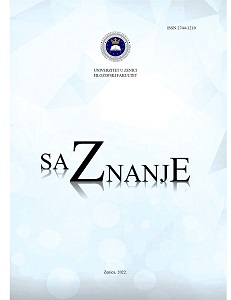UPOTREBA LEKSEMA EVLAT (DIJETE), OĞUL (SIN), KIZ (KĆI) I YAVRU (DIJETE) U FUNKCIJI IDENTITETSKIH MARKERA U ROMANU KAFAMDA BİR TUHAFLIK AUTORA ORHANA PAMUKA
THE USE OF LEXEMES EVLAT (CHILD), OĞUL (SON), KIZ (DAUGHTER) AND YAVRU (CHILD) AS IDENTITY MARKERS IN KAFAMDA BİR TUHAFLIK BY ORHAN PAMUK
Author(s): Edina Solak, Mirza BašićSubject(s): Lexis, Pragmatics, Turkish Literature, South Slavic Languages, Turkic languages
Published by: Filozofski fakultet, Univerzitet u Zenici
Keywords: Turkish language; forms of address; family relations; identity markers; positive face;
Summary/Abstract: In Turkish language, the lexemes evlat (child), oğul (son), kız (daughter) and yavru (child) are forms of address expressing family relations. In certain contexts, the above-mentioned lexemes are used as identity markers indicating belonging to a group. In such situations, the above-mentioned forms of address are studied within the strategies of positive politeness directed towards the interlocutor’s positive face. This paper analyzes the pragmatic value of the identity markers evlat (child), oğul (son), kız (daughter) and yavru (child) in conversations identified in a novel by Orhan Pamuk titled Kafamda Bir Tuhaflık. The paper analyzes the suggested translational equivalents of the conversations where the lexemes evlat (child), oğul (son), kız (daughter) and yavru (child) are used as identity markers indicating belonging to a group. A contrastive analysis is used to identify whether the identical pragmatic values of these forms of address are activated in both Turkish and Bosnian languages.
Journal: saZnanje
- Issue Year: 3/2022
- Issue No: 3
- Page Range: 368-379
- Page Count: 12
- Language: Bosnian

